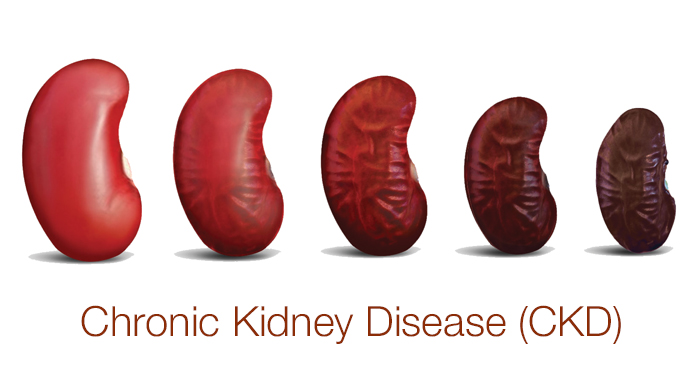Chronic Kidney Disease (CKD) means that your kidneys stop working well enough to keep you healthy. This is a process that usually takes place over a period of months or years. The process cannot be reversed, but with an early diagnosis, the right treatment and some lifestyle changes, it can be slowed down or in some cases even halted. If you have kidney disease, learn everything you can do about it; the correct treatment and changes in your lifestyle can help you stay healthier for longer. Your doctor will also work closely together with you to do everything to stop or at least slow down the progression of the disease by controlling the underlying causes.

CKD is divided into 5 disease stages (CKD 1-5). CKD stage 3 is often subdivided into 3a and 3b. For simplicity’s sake CKD stages 1 to 3a can be called early stage and CKD 3b to 5 late stage.
To help you make the right changes in your life it is necessary to know your disease stage, which tells you how far the disease has advanced. The five disease stages are determined on the basis of the glomerular filtration rate (GFR). Therefore, it is important for you to understand what the GFR is.
The glomerular filtration rate (GFR) is a measurement of kidney function that can be estimated from a simple blood test which measures the creatinine and albumin levels in your blood as well as taking into consideration your age, race, gender and other factors. By means of the GFR your doctor can determine your stage of kidney disease and plan your treatment. The lower your GFR the higher is the risk of the progression of the disease. The risk of progression provides information about how likely it is that CKD will advance.
In addition to the GFR, the level of albuminuria may be important. Albuminuria means that you have an abnormal amount of protein in your urine, which may be an early sign of ongoing kidney disease and means that your kidneys are not filtering your blood well enough. Albuminuria can be detected using a simple urine dipstick test to see if protein can be found in your urine. The higher your level of albuminuria the higher is your risk of progression of CKD.
Most people in the early stage (CKD 1, 2, and 3a) hardly have any symptoms or only very unspecific ones, which makes CKD hard to detect.
However proper treatment during these early stages of CKD can prevent or at least slow down progression of the disease. And this is why it is so important to know your stage, the corresponding symptoms and what you can do.
At stage 1 CKD, the glomerular filtration rate (GFR) is at a normal or increased level of 90 ml/min and above. Stage 1 is the mildest form of CKD and may pass by undetected because those affected do not experience any signs or symptoms.
A person with stage 2 CKD has kidney damage that causes a mild decrease in their glomerular filtration rate (GFR) to a level of 60-89 ml/min. Even at this stage, there are usually no symptoms to indicate that the kidneys are damaged.
A person with stage 3 CKD has moderate kidney damage. Stage 3 CKD is divided into stage 3a and stage 3b. In stage 3a, the glomerular filtration rate (GFR) is decreased to a level of 45-59 ml/min. Even at this stage, the patient often does not experience any symptoms that indicate that the kidneys are damaged.
In the early stage it is very important to slow down the progression of CKD and to reduce the risk of other complications. During CKD stages 1, 2 and 3a, conservative treatment such as a healthy lifestyle, a special diet and medication may be enough to stop or at least slow down the progression. A dietician will help you to understand which foods to avoid and which are okay for you to eat.
Your doctor will do everything to identify and treat the underlying renal disease. He will also prescribe medicines to help with problems such as high blood pressure and water retention. Hypertension can already occur at stage 1 CKD. Please see your doctor to check your blood pressure regularly.

There are no comments yet